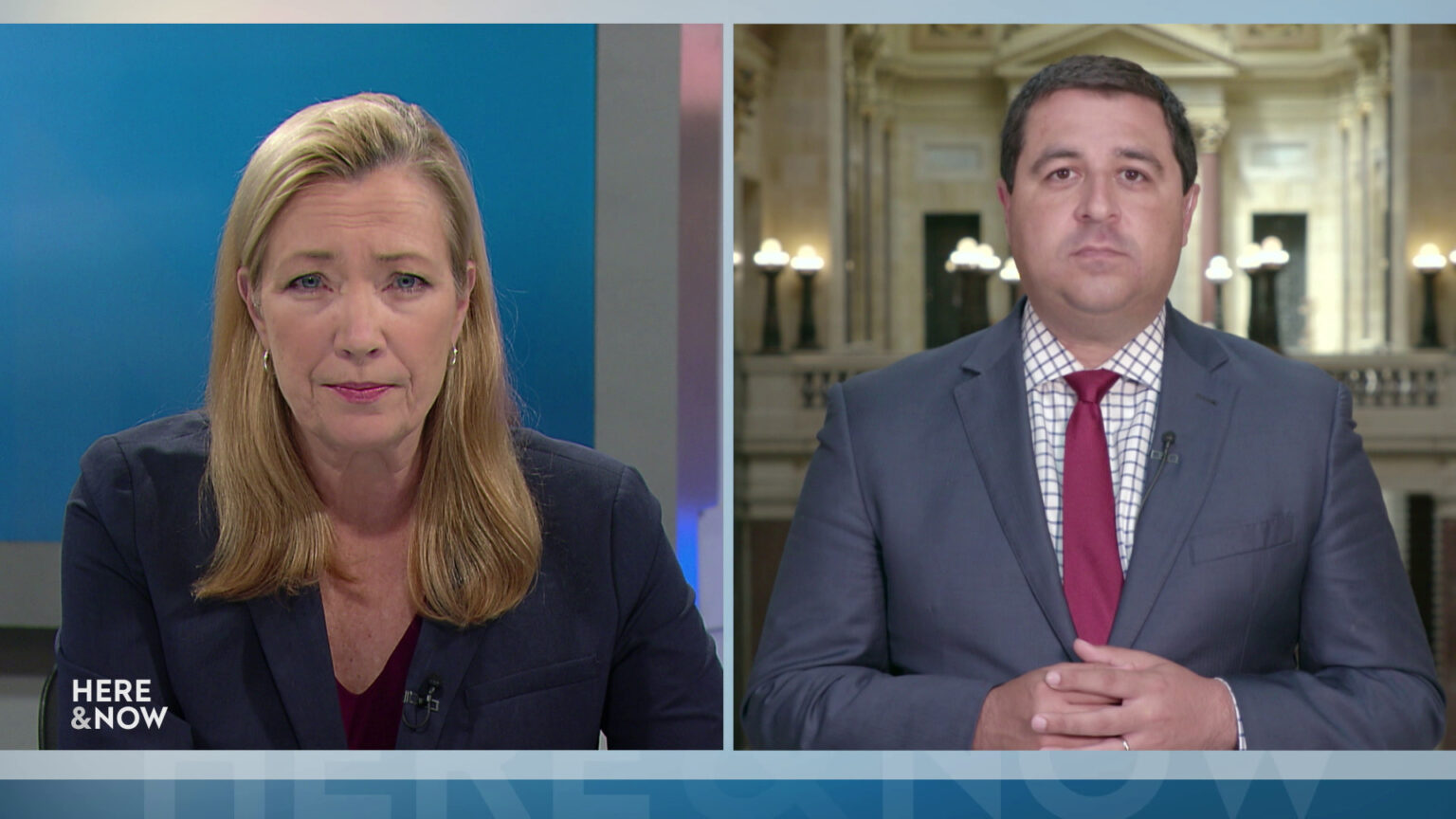'Here & Now' Highlights: Josh Kaul, Tim Gruenke, Amy Domeyer, Julie Uhal
Here's what guests on the July 1, 2022 episode said about legal and medical consequences in Wisconsin following the U.S. Supreme Court ruling in Dobbs v. Jackson overturning the 1973 Roe v. Wade decision establishing a federal right to abortion.
By Frederica Freyberg | Here & Now
July 5, 2022

Frederica Freyberg and Wisconsin Attorney General Josh Kaul (Credit: PBS Wisconsin)
When the U.S. Supreme Court overturned Roe v. Wade in its Dobbs v. Jackson decision, a 173-year-old law on Wisconsin’s books prohibiting abortions led providers to immediately suspend offering the procedure. State Attorney General Josh Kaul filed a lawsuit arguing an 1849 abortion law in Wisconsin is unenforceable because of newer laws that set different limits on abortionst. Some prosecutors in Wisconsin have pledged not to enforce abortion laws, but others – however, La Crosse County District Attorney Tim Gruenke, a Democrat, said he does not have the discretion to pick and choose which laws he enforces. Obstetrician-gynecologist Dr. Amy Domeyer said the current legal status of abortion in Wisconsin puts physicians and other health care providers in a tenuous position and worried about the care of their patients. Julie Uhal of Planned Parenthood of Illinois described an influx of women traveling there from surrounding states, including Wisconsin, where abortion is no longer available.
Josh Kaul
Wisconsin Attorney General (D)
- Despite the fact that Kaul argues the 1849 Wisconsin abortion law is unenforceable legally, could a county District Attorney intent on prosecuting an abortion case do so now?
- Kaul: “Well, my office can’t stop them from doing so. They can choose to use their resources however they want. I would discourage them from doing that because I’d much rather see them using their limited resources to prosecute serious offenses like homicides or sexual assaults or drug trafficking. But whether they can or not will ultimately depend on what happens with our suit. Because if the law can’t be enforced, as if we receive that ruling in the suit, then there would be no basis for enforcement. But if the Supreme Court finds that it can be enforced, then it’s up to the DAs whether they do, in fact, prosecute cases.”
Tim Gruenke
La Crosse County District Attorney (D)
- Gruenke said he personally opposes the reversal of Roe v. Wade, but would be obliged as District Attorney to prosecute abortion cases if Wisconsin’s law is determined to be enforceable. There are some DAs in Wisconsin who have pledged to not do so.
- Gruenke: “I understand the sentiment. I also think that women should have the right to control their own bodies, and I’m upset that Roe v. Wade was overturned. But my personal feelings just don’t play into it. When the Legislature passed a law that’s supposed to reflect the will of the people, as the DA in La Crosse County, I’m supposed to represent all the people across the county and not just take my personal views into it, things I don’t agree with. Prosecutors say they won’t enforce gun restrictions because they’re Second Amendment fans or prosecutors say they won’t enforce certain domestic violence or sexual assault cases because they have a different view of the law. I think it’s the same thing. I don’t think the DA should be in the business of not prosecuting laws passed by the legislature.”
Amy Domeyer, M.D.
Wisconsin legislative chair, American College of Obstetricians and Gynecologists
- Wisconsin OB-GYNs find themselves in murky waters when it comes to the state’s abortion law that prohibits the procedure outright except to save the life of the mother.
- Domeyer: “[Our] professional society of OB-GYNs is trying to figure out how to best provide the safest care for our patients so that we aren’t waiting until a patient cannot be pulled back. I think there may be this misconception that, ‘oh, the life of the mother — well, we can just decide at some point that she’s sick enough and then provide treatment’ and all is well. Patients that are allowed to get sick enough are in the ICU. They may have to have their uterus removed for lifesaving care. So it isn’t so easy in terms of medical decision-making to provide a quick fix once a person has gotten that far ill. And prior to this decision, if it got to that point, it was because a patient chose to be there. It was because the patient felt strong enough about that pregnancy and continuing that they accepted the risk of severe illness or potential death. Now with this law, that won’t be the case.”
Julie Uhal
Planned Parenthood of Illinois
- When the U.S. Supreme Court overturned Roe v. Wade, patients in the waiting rooms of Planned Parenthood clinics in Wisconsin were immediately told their procedures were being suspended. The group assigned patient navigators to help them find out-of-state options where abortions remain legal, including across Wisconsin’s border in Illinois.
- Uhal: “We’ve been preparing for this moment for a really long time, and projections have shown that we’re anticipating to see up to 20-30,000 additional abortion patients from our neighboring states annually now that Roe has been overturned. It’ll take a long time to see exact numbers and trends. It’s only been a week. It feels like five years since the decision came down. But I can share that our call volume doubled on Friday and Saturday following that (June 24, 2022) decision, including from Wisconsin patients who may have been at the clinic or an important appointment last Friday and were forced to reschedule that. And it created a lot of chaos and confusion.”
Watch new episodes of Here & Now at 7:30 p.m. on Fridays.
 Passport
Passport











Follow Us